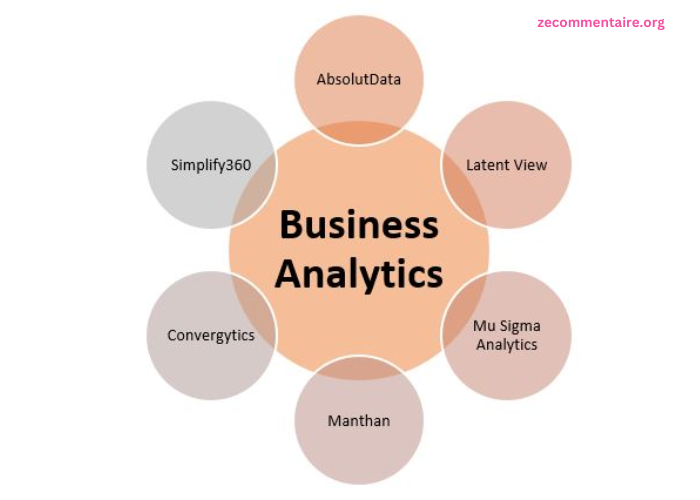In the contemporary data-driven world, businesses rely heavily on analytics to gain valuable insights, drive strategic decision-making, and stay competitive. As the demand for data-driven insights continues to soar, business analytics has emerged as a cornerstone of modern business operations. This blog delves into the top job prospects in business analytics, exploring the diverse range of roles and opportunities available to professionals in this dynamic field. From data analysts to business intelligence specialists and data scientists, we uncover the key skills, qualifications, and industry trends shaping the landscape of business analytics careers. Join us as we explore the exciting world of business analytics and unlock the doors to lucrative career paths in this rapidly evolving field.
A Masters in Business Analytics offers a comprehensive curriculum that delves deep into advanced analytics techniques, data management, and business strategy. This specialized degree equips individuals with the comprehensive knowledge and practical skills required to excel in top job roles in business analytics. Additionally, the prestige of a master’s degree enhances credibility and opens doors to coveted career opportunities. Employers value the advanced expertise and specialized training gained through a master’s program, making graduates more competitive in the job market. Thus, pursuing a Master’s in Business Analytics facilitates entry into top job roles and paves the way for better career prospects and advancement.
An Introduction to a career in business analytics
In today’s data-driven landscape, a career in business analytics has emerged as a pathway to success for individuals seeking to leverage data insights for strategic decision-making and business optimization. Business analytics professionals play a pivotal role in extracting valuable insights from vast datasets, driving informed decisions, and shaping the trajectory of organizations across industries. With a combination of technical expertise, analytical skills, and business acumen, professionals in this field decode complex data patterns to uncover opportunities, mitigate risks, and drive innovation. In this blog, we delve into the dynamic world of business analytics, exploring the diverse career opportunities, essential skills, and industry trends shaping this rapidly evolving field. Join us as we embark on a journey to unravel the endless possibilities of a career in business analytics.
As organizations increasingly adopt data-driven decision-making, the need for skilled professionals proficient in business analytics is rising. This surge in demand has led to a proliferation of various job roles, including:
Business Analyst: Business analysts play a pivotal role in bridging the gap between the business objectives and technical solutions within an organization. They act as consultants, problem solvers, and strategists, working closely with the stakeholders to understand business needs, identify opportunities, and propose data-driven solutions. Business analysts analyze processes, systems, and data to optimize efficiency, streamline operations, and drive growth. They facilitate communication between different departments, translating business requirements into actionable insights for technical teams. Additionally, they monitor key performance indicators (KPIs), track project progress, and ensure alignment with organizational goals.
Data Scientists: Data scientists are skilled professionals who leverage their expertise in data analysis, statistics, and machine learning to extract the valuable insights from massive and complex datasets. They employ a variety of techniques, including predictive modeling, clustering, and classification, to uncover patterns, trends, and correlations within data. Data scientists work across industries to solve complex problems, like predicting customer behavior, optimizing business processes, and identifying market trends. They are proficient in programming languages, such as Python or R, possess strong statistical knowledge, and have a knack for data storytelling to communicate their findings effectively.
Business Intelligence Analyst: Business intelligence analysts also focus on transforming raw data into actionable insights to support business decision-making processes within organizations. They typically collect, analyze, and interpret data from various sources to create reports, dashboards, and visualizations that offer insights into key performance metrics and trends. Business intelligence analysts play a crucial role in helping organizations understand their market position, identify areas for improvement for making informed decisions based on data-driven insights. They possess strong analytical skills, proficiency in BI tools, and the capability to translate complex data into clear and concise reports for stakeholders.
Visualization Expert: Visualization experts specialize in creating visually appealing and informative data visualizations that facilitate understanding and interpretation of complex data insights. They use a combination of design principles, data storytelling techniques, and visualization tools to develop interactive dashboards, charts, graphs, and infographics. Visualization experts collaborate closely with data scientists, business analysts, and other stakeholders in designing and implementing visualizations that effectively communicate key findings and support decision-making processes. They possess creativity, attention to detail, and a deep understanding of both data and design to create compelling visualizations that resonate with audiences.
Machine Learning Engineer/Data Engineer: Machine learning and data engineers are typically responsible for building and maintaining data pipelines, infrastructure, and machine learning systems within organizations. They collect, preprocess, and clean data, build and deploy machine learning models, and optimize data infrastructure for scalability and performance. These professionals develop and deploy predictive models, while data engineers often focus on building and maintaining data pipelines and infrastructure. They possess proficiency in programming languages, expertise in big data technologies, and strong software engineering skills to design and implement robust and scalable data solutions.
These job prospects offer diverse opportunities for professionals with varied skill sets and interests, contributing to the growing demand for data-driven decision-making and analytics talent.
Conclusion
Business analytics presents an array of promising job prospects for individuals keen on leveraging data-driven insights to drive organizational success. From roles such as business analysts and data scientists to business intelligence analysts and visualization experts, the demand for skilled and qualified professionals in business analytics field continues to soar across industries. Pursuing a Masters in Business Analytics enhances knowledge and expertise in data analysis and decision-making and significantly elevates career prospects. With a master’s degree, individuals in gaining a competitive edge in the complex job market, positioning themselves for lucrative opportunities and advancement in the dynamic field of business analytics.






